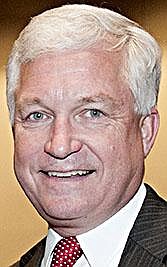The minimum age to buy tobacco in Arkansas rises today.
Tobacco buyers must be 19 years old or close (born on or before Dec. 31, 2000), under a new state law that takes effect today. The minimum age will rise to 21 by the end of 2021.
Act 580 of 2019 also increases the minimum markup on cigarettes, raises taxes on cigarette papers and repeals the reduced border city tobacco tax rate, all to raise state revenue to help the University of Arkansas for Medical Sciences obtain designation from the National Cancer Institute.
The changes take effect as state lawmakers contemplate how to address the increasing use of electronic cigarettes, particularly among teens.
A provision to impose a special excise tax on e-cigarettes — similar to the so-called sin tax on traditional cigarettes — was included in the initial version of the bill that became Act 580, but it was taken out because it was too controversial, the sponsor, Rep. Andy Davis, R-Little Rock, said last week.
Senate President Pro Tempore Jim Hendren, R-Sulphur Springs, also sponsored a bill that would have imposed an excise tax on e-cigarettes, but it died in the House after passing in the Senate.
The Legislature won’t convene for its next regular session until 2021, and Hendren and Gov. Asa Hutchinson last week tamped down talk of a special session to address the use of e-cigarettes, commonly called vaping.
Hendren said there’s simply not enough of a consensus among lawmakers on the issue right now, but he said he and the Senate Public Health, Welfare and Labor Committee chairwoman, Missy Irvin, R-Mountain View, will lead a legislative study on the matter with hearings to begin this month.
“It’s going to take a lot of changing of a lot of attitudes to get there,” Hendren said.
The influence of the tobacco industry and hesitance of the Republican-majority Legislature to create any new taxes has made it difficult to implement policies that public-health advocates say would curtail e-cigarette use.
Even Act 580 had the imprint of the tobacco lobby, drawing criticism from public-health groups: A provision included in the bill pre-empts local governments from imposing stricter tobacco regulations than those on the state level.
Davis, the bill’s sponsor, said the primary objective of Act 580 was to secure funding for UAMS. The tobacco policy issues were secondary. The new law also pulls some medical-marijuana tax revenue to dedicate to UAMS.
The bill dedicates revenue to a trust fund that UAMS will use to help it pursue designation from the National Cancer Institute. Medical school officials have said that the $10 million in additional state funding will help pave the way for recognition from the institute.
“The funds allow the recruitment of cancer physicians and scientists who will be critical to further developing the transdisciplinary research and cutting-edge cancer treatments that are the hallmark of [an] NCI designated center,” Leslie Taylor, the UAMS vice chancellor of communications and marketing, said in an email. “The recruitment has already begun and the additional faculty will have immediate beneficial effects on our cancer programs. Having NCI designation also opens the door for our patients to be able to access clinical trials and therapies and for our scientists to access research funding that would otherwise be unavailable in Arkansas.”
Taylor said that designation from the National Cancer Institute, expected to take about five years, is projected to have a $72 million-a-year economic impact on the state, creating more than 1,500 jobs.
Steve Goode, administrator of Arkansas Tobacco Control, said the agency has been busy conducting training sessions for retailers in preparation for Act 580.
In past years, about 50-75 retailers would attend the tobacco agency’s annual training sessions, Goode said.
“Since this law, we’ve increased our training, and the average attendance has been over 200,” he said.
The immediate effect of the law will be slightly higher prices on cigarette products because of the increase in required minimum markup from 7.5% to 9.5% and the new 50-cent tax on packages of cigarette papers.
Dr. Joe Thompson, president and CEO of the Arkansas Center for Health Improvement, said he hopes the long-term impact of Act 580 is reduced smoking rates.
While the increase in cigarette prices will be mostly minimal, Thompson said any increase in price makes it more difficult for new smokers to start.
He also said that the once the minimum buying age moves to 21, fewer young people will develop nicotine addictions.
“In your teen years, the brain is still developing and is more susceptible to addiction,” he said, adding that the effectiveness of the new law will be contingent upon rigid enforcement.
VAPING TAXES?
Thompson also said he hopes the Legislature will implement some policies to address rising rates of teen e - c i g a r e t t e use.
The most common recommendation among public-health advocates is to tax e-cigarettes in the same manner that cigarettes are taxed. In Arkansas, cigarettes carry a special excise tax of $1.15 per pack.
Currently, the only tax imposed on e-cigarettes in Arkansas is standard sales and use tax.
Fifteen states, including Louisiana and Kansas, have passed excise taxes on e-cigarettes in recent years.
An alliance of Arkansas vape shops last week again proposed a 2% tax on “e-liquid,” which is consumed through vaping, but Hendren, the Senate leader, said that industry probably shouldn’t dictate the tax rate that affects it.
He also said a 2% tax was too low, noting that Arkansans pay $400 million-$500 million each year to cover Medicaid costs related to smoking.
Recent surveys have found that e-cigarette use in schools has increased drastically in Arkansas and the U.S. since 2011.
A 2017 state Department of Health survey found that 1 in every 5 Arkansas students between sixth and 12th grades had tried e-cigarettes, and that rate is thought to have climbed even higher over the past two years.
Last week, public-health officials warned Americans who aren’t already smokers to avoid e-cigarettes and other vaping devices after a mysterious outbreak of a severe lung disease emerged in recent weeks. Officials have documented at least 215 cases in 25 states of people who became sick using e-cigarettes. The officials are looking into whether the cause is the use of altered or homemade vaping products. Many people believe e-cigarettes are safer than tobacco products but officials are still studying their side effects and risks.
Thompson said that vaping can be just as addictive if not more so than traditional cigarettes.
“We’re looking at a major health epidemic coming in our youth,” Thompson said.
BORDER TAX
In order to generate more state revenue for UAMS, the sponsors of Act 580 included a provision that repeals an exemption from Arkansas law that allowed tobacco retailers near bordering states to charge lower tax rates to remain competitive.
Several north Arkansas mayors only recently found out about the repeal of the border tax rate provision, and they’re concerned about the effect it could have on their small towns.
In Garfield, a town of 502 in Benton County, a significant portion of the city’s sales-tax base is dependent on the handful of retailers that sell tobacco products, said Mayor Gary Blackburn.
And those stores owe much of their business to tobacco consumers from other Arkansas cities, such as Rogers, who drive to Garfield to buy tobacco products in bulk to save money.
After today, Blackburn fears that those customers will take their business just across the state line to Missouri where the per-pack tax is 98 cents less.
“I don’t believe anyone wanted to hurt Garfield, but as it worked out, it’s going to have a significant negative economic impact,” Blackburn said, noting that the city had already started cutting some expenses from its about $300,000-a-year general-revenue budget.
Zane Sharif, who owns Village Market in Garfield, said he expects his convenience store sales to be cut in half after Act 580 takes effect today. He said about 60% of his store’s sales are from tobacco products, and many customers already told him they’ll begin buying cigarettes in Missouri after today.
“It was pretty bomb-drop news to us,” Sharif said, noting that he only found out about the new law in early August when tobacco company representative told him about it.
“I have no idea what kind of impact it’s going to create on jobs here. If business goes down, we’ll have to lay off people.”
Information for this article was contributed by Bloomberg News.


